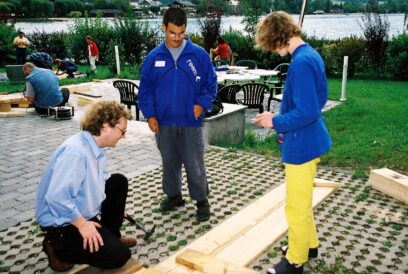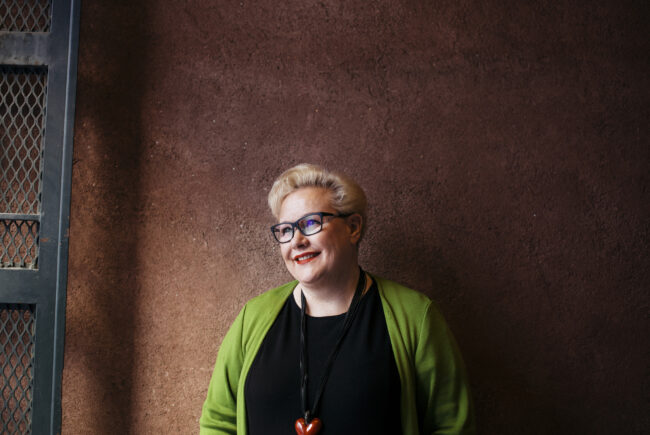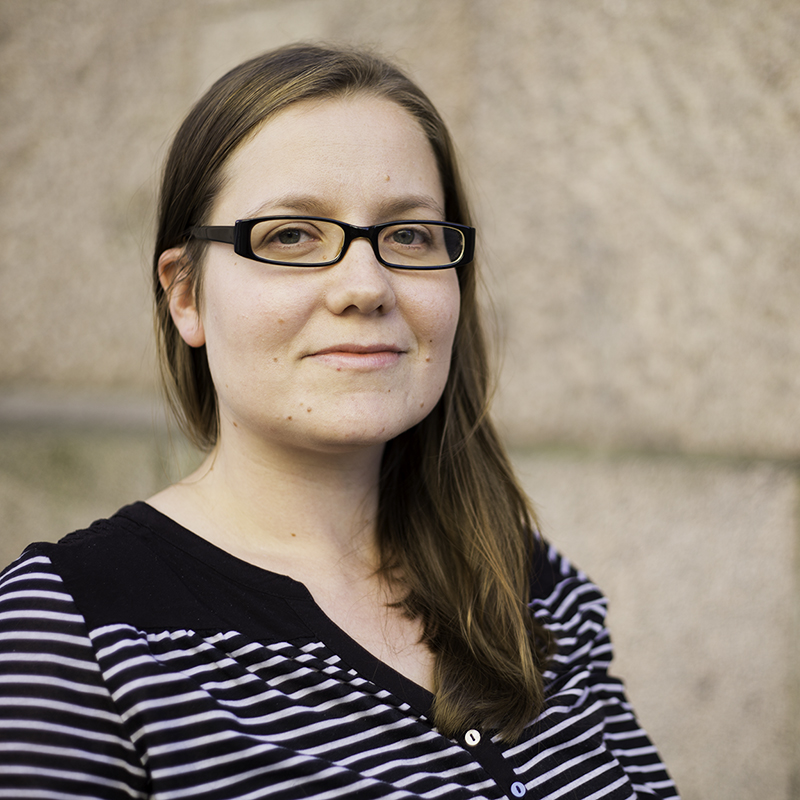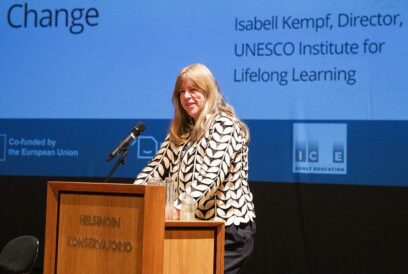

MEP Sirpa Pietikäinen proposes that non-formal adult education institutes provide certificates in citizenship skills or basic skills. /Photo: Vilja Pursiainen
MEP Sirpa Pietikäinen proposes that non-formal adult education institutes provide certificates in citizenship skills or basic skills. /Photo: Vilja Pursiainen
Adult educators need to make the benefits of adult education in integration visible to decision-makers, says MEP Sirpa Pietikäinen.
What are the main challenges when it comes to the integration of migrants in Europe?
“The main challenge is for the processes for receiving asylum seekers to be made quicker and more fluent.
The European Commission has put forward a motion for the revision of the Dublin regulation and setting of a common European asylum system.
The Dublin regulation refers to the fact that the responsibility for processing an asylum application lies with a single member state. This requirement puts a lot of pressure on and demands much resources from some member states, such as Greece or Italy.
Finland received around 30,000 asylum seekers in 2015. We could accommodate up to 300,000 people, but it depends whether people come over several years or just a few months.
If the EU had a common, jointly-supervised border, the states could share technical and financial aid and knowledge in processing asylum applications and people would not be left in uncertainty for such a long time.
Another challenge is a steady integration process.
The process should be able quickly to identify whether a person has a legal basis for granting asylum to enable moving on with the process. The interviews and definitions of skills profiles could then be started more quickly.
When skills and educational background are identified early on, the person can easily be directed down a proper learning pathway. Those who lack basic education could also be identified more easily. A nuclear physicist has different educational needs to someone with limited basic skills.
What is the role of adult education in integration?
The role of the adult education sector is twofold. Firstly, adult education institutes could be involved in interviewing newcomers and defining the skills profiles. Secondly, they could contribute to designing the learning pathways.
Adult education institutes already provide language courses and civic skills courses for migrants. In the future, they should also be able to provide more tailor-made learning or packages from which the learner – be it a nuclear physicist or someone in need of basic skills – could choose and build their own learning pathway.
I am also proposing that non-formal adult education institutes provide certificates – not vocational certificates but certificates in citizenship skills or basic skills. The formal education sector alone cannot deal with this challenge.
Are there groups that are left out of adult education and what can be done about it?
“When it comes to asylum-seekers, many are left out of education because ideally the learning pathway should start immediately after arrival. In some cases, low daily allowances hinder the ability to participate in the education provided by, for example, non-formal adult education institutes. Asylum-seekers often need to go through the long process of asylum application before being able to fully participate in learning.
Another highly vulnerable group are those left without asylum. The undocumented immigrants do not just disappear if they are not granted asylum or a residence permit. They should be recognised.
In addition, there are a lot of groups such as the disabled that often face extra challenges in accessing learning opportunities.”
How does the European Union promote the integration of migrants?
“The role of the EU is to provide principles, guidelines and roadmaps upon which the member states base their concrete actions. Education and migration policy are mainly conducted on a national level.
At the same time, more and more people are working and living in different EU countries. The situation calls for the harmonisation of not only migration policy but also education policy. For example, education certificates admitted in one EU country should be valid in other EU countries as well. Common standards between member states to ensure the validation of skills could ensure that resources, skills or good practices are not lost.
The European Commission’s recent proposals are a step in the right direction. The European Pillar of Social Rights, a proposal proclaimed by the Commission in November recognises lifelong learning and access to it as one of its key priorities.
The New Skills Agenda, adopted by the Commission in 2016, launched actions to equip Europeans with proper skills. The agenda specifically calls for EU member states to identify the skills of non-EU migrants and to ease migrants’ path to work or education.
In November, the Commission also launched a proposal for forming the European Education Area. One of the aims of the proposal is to reduce the number of low-skilled adults in Europe. Currently a quarter of people in the EU lack basic numeric, digital and literacy skills. Through the proposal, the Commission aims to more than halve the number of people with low skills, setting the benchmark at a 10% share of low achievers and early school-leavers. The Commission needs to suggest ways of achieving these goals.
The EU member states are expected to implement the proposal in practice. In the end, the harmonisation of standards is mainly a question of the will of the member states.
There is a lot of discussion on whether some member states – for example those that are part of the European Monetary Union – could allow more jurisdiction to the EU when it comes to migration or education policy. This would mean that EU institutions could, for example, set minimum requirements for migration policies or education policies.”
How should the EU promote the participation of migrants in adult education?
“The EU should have the right to recognise and validate skill sets. Currently this is in the hands of the member states.
The EU could define citizenship skills, basic skills or digital skills and provide a sort of “citizen’s certificate” or a “lifelong learning pass”. This would harmonise and validate prior learning. It does not make sense that, if a person has received a diploma in Sweden and then comes to Finland, they need to start their studies all over again.
The EU could also provide more funding for integration. Even quite small sums compared to the overall EU budget could help integration. Funding of few 100 million euros per year could be earmarked for the adult education sector to strengthen citizenship skills and basic skills.”
What should the EU migration policy be like for it to support lifelong learning and equal learning opportunities?
“There are three puzzle pieces that should be put together.
Firstly, there is the prevention of migration flows. Development cooperation and environmental policies play a big role, as global challenges such as the climate change will likely double the movement of migrants in the future. Improving the quality of education in African countries also plays a part.
Secondly, the focus should be on ensuring the quick and fluent process of asylum-seeking. We cannot just close our eyes to the asylum-seekers and expect that people will not move. We need to be ready to receive migrants from very different backgrounds.
Thirdly, and equally important, is the development of legal pathways for working in the EU area, either short-term or as a permanent citizen after a certain period. The EU has developed the Blue Card – a similar work permit to the Green Card in the United States – but it is poorly known and is not used in any of the EU member states.
For some reason, member states oppose quick pathways to learning or work because they are “afraid” that it may be interpreted as a sign of the asylum being granted. It could, however, be easily indicated that this is not the case, and it would still be better to have the asylum-seekers quickly participating in work or education.”
We know adult education has a role in migrants’ integration. How do we get policy-makers in the EU to recognise that?
“The non-formal adult education sector should provide a ‘for dummies’ version of the links between adult education and integration, send it to all the party leaders and ministers, call them and meet with them, and then call and meet again.
It is important to take the message to national policy-makers because, instead of the European Commission or the European Parliament, it is the European Council that should be convinced. The Council, consisting of the heads of states and interior ministers of member states, is the one to decide on migration and education policies in the end.”
Author






